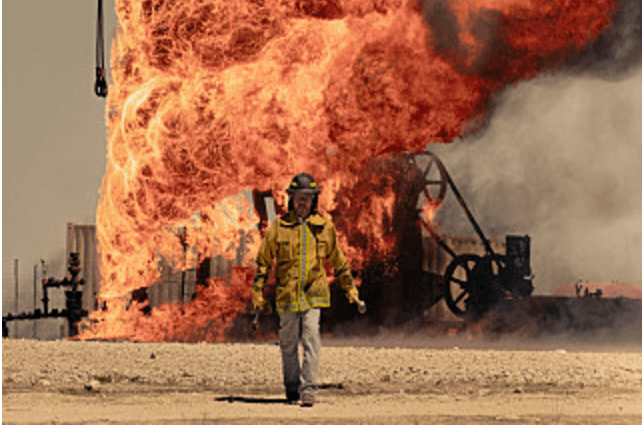What a landsman needs to know about ‘Landman’
The new Taylor Sheridan series has an — almost — very Jewish title

Billy Bob Thornton as a landman (not landsman) in Landman. Courtesy of Paramount+
An ad on a subway platform on the Upper West Side now advertises a show that, at first glance, appears to be pandering to locals. If you’re not paying attention — or only caught a glimpse before the video screen transitioned to something else — you’d be forgiven for thinking it says “Landsman,” meaning a Jewish coreligionist.
Nu?
Not quite. The new Paramount+ series, by prolific Western revivalist Taylor Sheridan, is called Landman, which apparently is the name of a guy who secures oil rights for gas companies — so more like a claim negotiator than someone you’d snag for a minyan.
The name, like the Yiddish “landsman,” is taken from a straightforward etymology — “land” and “man.” In Yiddish it’s a fellow Jew, but more directly someone from the same part of the world — name your shtetl. In oil terms, it’s someone whose job is to “secure the lease then manage the people.”
But is there any Yiddishkeit at all?
The first four episodes of the show follow the exploits of landman Tommy Norris (Billy Bob Thornton) as he complains about his ex-wife, chain smokes to deal with the stress of having an attractive and sexually active daughter and manages explosive crises related to the oil fields.
In a sense, Tommy’s business is real estate, and working in the desert of Midland, Texas (a kind of Lone Star Midbar) rehashes some of Genesis in his land purchase and establishment of wells — though they’re full of oil. It’s not quite Sarah’s tomb, or the biblically significant sources of water dug by Abraham, but it comes with its own negotiating and its own unique issues of liability.
In the first episode, a plane collides with an oil tanker, creating an almost Talmudic string of conditions: If a truck carrying oil on a road owned by another is hit by a plane belonging to the ones who own the road, but flown by people who stole it to transport drugs, who is liable? Sub out trucks for an ox that gored someone and it’s the sort of hypothetical our sages relished.
The matter is disputed at a deposition, a scene that plays out like a Talmudic dialectic with coarser language.
Firmly in the Bible Belt, Midland appears free of Jews. Even a lawyer named Nathan, whose primary role is to become flustered when Tommy’s ex-wife and nubile daughter traipse around the house in their underwear or leggings, doesn’t seem to belong to a shul board.
The promise of the land then mostly extends to biblical suggestion.
Men working the pumpjacks encounter a pillar of fire, like that described in Exodus 13:21 (in this case it consumes, rather than protects).
In a pivotal scene in a series that lends ad space to the American Petroleum Institute, Tommy takes his company’s cosmopolitan lawyer, Rebecca Falcone (Kayla Wallace) to a row of wind turbines and bestows on her the forbidden knowledge that “clean energy” may not be so environmentally friendly after all. Shortly after this inconvenient truth is revealed, a rattlesnake appears like that serpent in Eden. Tommy quickly cuts off its head, a hasty decapitation recalling his pocketknife severing of his fingertip a few episodes before (call it alternate circumcision, if you want — only slightly more clinical than Tzipporah at the inn).
Against his wishes, Tommy sacrifices his son, Cooper (Jacob Lofland) to a life in the oil patch instead of higher education. A chatty waitress informs the women in his family that diet pills contain shrimp tails. The Land of Milk and Honey is instead the terrain of crude oil, where men wear Stetsons not kippot.
Yet with Sheridan’s signature smartass dialogue, which is resolutely anti-woke, there is a vision of classic patriarchy that remains undisturbed. The women — except for the tough cookie lawyer who Tommy makes a transphobic joke about — are often in their bathing suits or. in the case of a gas company widow, nursing a baby. The main enterprise women are allowed is a shack called “Babes N Brew,” where baristas in bikini tops make coffee orders for the men on their way to the field.
Yet it is within that shack of sanctuary — a sort of tabernacle in a strip mall — that the haste and mission of oilmen is felt.
“Learn to drink it black cause everything we do is on the fucking go,” says a member of Cooper’s crew, echoing the nixed yeast of the fleeing Israelites out of Egypt.
These instances aside, Landman is perhaps the least Jewish show now on television, and yet there is an affinity beyond the title.
As Tommy’s boss, Monty Miller (Jon Hamm) explains, this oil industry is one of “constant crisis interrupted by brief periods of intense success.”
If that isn’t a capsule summary of Jewish history, I don’t know what is.
A message from our Publisher & CEO Rachel Fishman Feddersen

I hope you appreciated this article. Before you go, I’d like to ask you to please support the Forward’s award-winning, nonprofit journalism so that we can be prepared for whatever news 2025 brings.
At a time when other newsrooms are closing or cutting back, the Forward has removed its paywall and invested additional resources to report on the ground from Israel and around the U.S. on the impact of the war, rising antisemitism and polarized discourse.
Readers like you make it all possible. Support our work by becoming a Forward Member and connect with our journalism and your community.
— Rachel Fishman Feddersen, Publisher and CEO






























